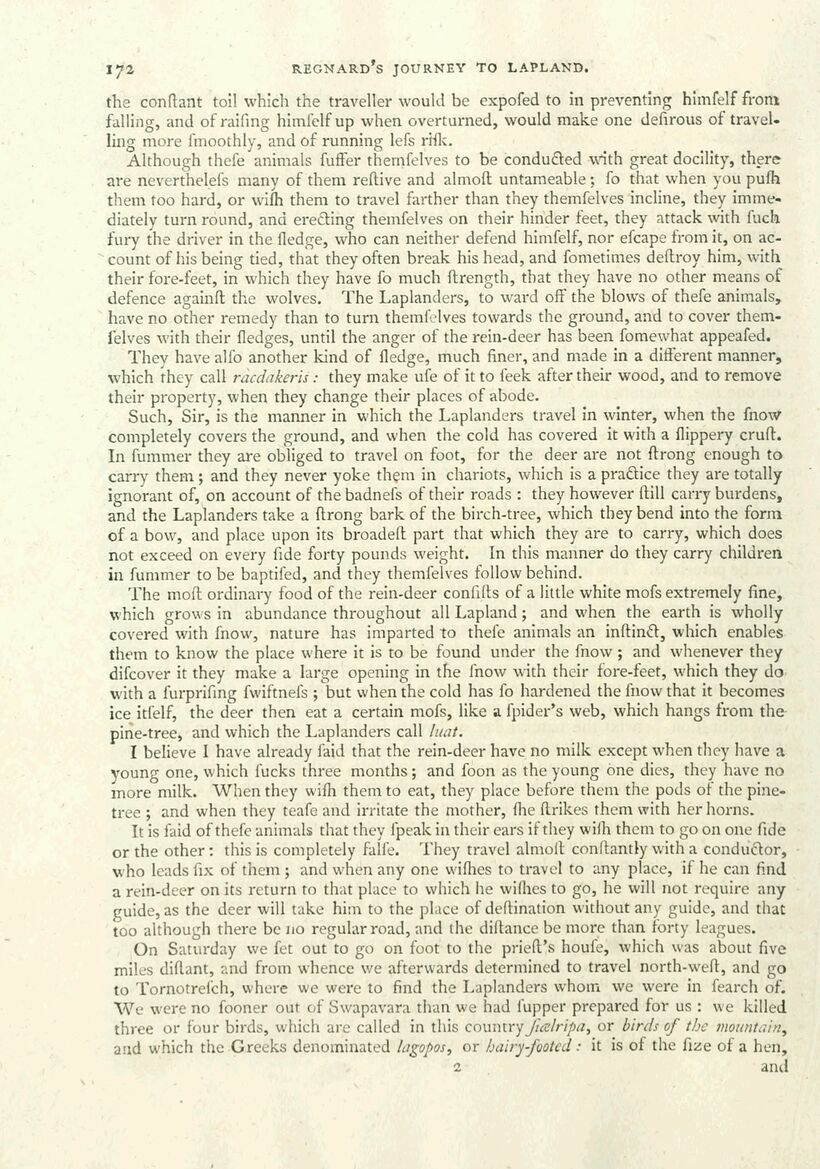
Full resolution (JPEG) - On this page / på denna sida - Pages ...

<< prev. page << föreg. sida << >> nästa sida >> next page >>
Below is the raw OCR text
from the above scanned image.
Do you see an error? Proofread the page now!
Här nedan syns maskintolkade texten från faksimilbilden ovan.
Ser du något fel? Korrekturläs sidan nu!
This page has never been proofread. / Denna sida har aldrig korrekturlästs.
172 REGNARD’S JOURNEY TO LAPLAND.
the conftant toil which the traveller would be expofed to in preventing himfelf from
falling, and of raifing himfelf up when overturned, would make one defirous of travel-
ling more fmoothly, and of running lefs rifk.
Although thefe animals fuffer themfelves to be conduéted with great docility, there
are neverthelefs many of them reftive and almoft untameable; fo that when you pufh
them too hard, or wifh them to travel farther than they themfelves incline, they imme-
diately turn round, and erecting themfelves on their hinder feet, they attack with fuch
fury the driver in the fledge, who can neither defend himfelf, nor efcape from it, on ac-
count of his being tied, that they often break his head, and fometimes deftroy him, with
their fore-feet, in which they have fo much ftrength, that they have no other means of
defence againft the wolves. The Laplanders, to ward off the blows of thefe animals,
have no other remedy than to turn themfelves towards the ground, and to cover them-
felves with their fledges, until the anger of the rein-deer has been fomewhat appeafed.
They have alfo another kind of fledge, much finer, and made in a different manner,
which they call racdakeris : they make ufe of it to feek after their wood, and to remove
their property, when they change their places of abode.
Such, Sir, is the manner in which the Laplanders travel in winter, when the fhow
completely covers the ground, and when the cold has covered it with a flippery cruft.
In fummer they are obliged to travel on foot, for the deer are not ftrong enough to
carry them; and they never yoke them in chariots, which is a practice they are totally
ignorant of, on account of the badnefs of their roads : they however ftill carry burdens,
and the Laplanders take a {trong bark of the birch-tree, which they bend into the form
of a bow, and place upon its broadeft part that which they are to carry, which does
not exceed on every fide forty pounds weight. In this manner do they carry children
in fummer to be baptifed, and they themfelves follow behind.
The moft ordinary food of the rein-deer confifts of a little white mofs extremely fine,
which grows in abundance throughout all Lapland; and when the earth is wholly
covered with fnow, nature has imparted to thefe animals an inftin&t, which enables
them to know the place where it is to be found under the fnow; and whenever they
difcover it they make a large opening in the {now with their fore-feet, which they do:
with a furprifing fwiftnefs ; but when the cold has fo hardened the fnow that it becomes
ice itfelf, the deer then eat a certain mofs, like a fpider’s web, which hangs from the
pine-tree, and which the Laplanders call /wat.
I believe I have already faid that the rein-deer have no milk except when they have a
young one, which fucks three months; and foon as the young one dies, they have no
more milk. Whenthey with them to eat, they place before them the pods of the pine-
tree ; and when they teafe and irritate the mother, fhe ftrikes them with her horns.
It is faid of thefe animals that they {peak in their ears if they with them to go on one fide
or the other: this is completely falfe. ‘They travel almoft conftantly with a conduétor, -
who leads fix of them; and when any one wifhes to travel to any place, if he can find
a rein-deer on its return to that place to which he wifhes to go, he will not require any
guide, as the deer will take him to the place of deftination without any guide, and that
too although there be no regular road, and the diftance be more than forty leagues.
On Saturday we fet out to go on foot to the prieft’s houfe, which was about five
miles diftant, and from whence we afterwards determined to travel north-weft, and go
to Tornotrefch, where we were to find the Laplanders whom we were in fearch of.
We were no fooner out of Swapavara than we had {upper prepared for us: we killed
three or four birds, which are called in this country /@lripa, or birds of the mountain,
and which the Greeks denominated /agopos, or hairy-footed : it is of the fize of a hen,
2 and
<< prev. page << föreg. sida << >> nästa sida >> next page >>